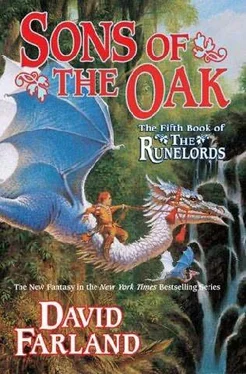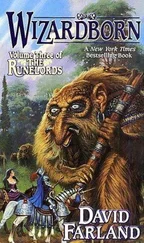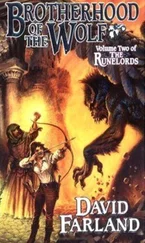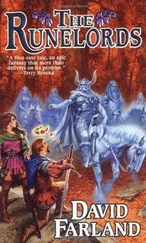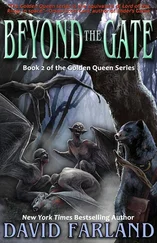David Farland - Sons of the Oak
Здесь есть возможность читать онлайн «David Farland - Sons of the Oak» весь текст электронной книги совершенно бесплатно (целиком полную версию без сокращений). В некоторых случаях можно слушать аудио, скачать через торрент в формате fb2 и присутствует краткое содержание. Жанр: Фэнтези, на английском языке. Описание произведения, (предисловие) а так же отзывы посетителей доступны на портале библиотеки ЛибКат.
- Название:Sons of the Oak
- Автор:
- Жанр:
- Год:неизвестен
- ISBN:нет данных
- Рейтинг книги:5 / 5. Голосов: 1
-
Избранное:Добавить в избранное
- Отзывы:
-
Ваша оценка:
- 100
- 1
- 2
- 3
- 4
- 5
Sons of the Oak: краткое содержание, описание и аннотация
Предлагаем к чтению аннотацию, описание, краткое содержание или предисловие (зависит от того, что написал сам автор книги «Sons of the Oak»). Если вы не нашли необходимую информацию о книге — напишите в комментариях, мы постараемся отыскать её.
Sons of the Oak — читать онлайн бесплатно полную книгу (весь текст) целиком
Ниже представлен текст книги, разбитый по страницам. Система сохранения места последней прочитанной страницы, позволяет с удобством читать онлайн бесплатно книгу «Sons of the Oak», без необходимости каждый раз заново искать на чём Вы остановились. Поставьте закладку, и сможете в любой момент перейти на страницу, на которой закончили чтение.
Интервал:
Закладка:
“What are you so happy about?” she asked.
“Oh, nothing,” he said.
She looked for a reason, and realized that it was true. He was just happy.
He deserves to be, she thought, wiping a tear from her eye with the corner of her apron.
Rhianna was another story. She didn’t smile for many long months, and often at night she would wake in terror, sweating furiously, so frightened that she could not cry out, or even move, but only lay abed, her teeth chattering.
On such nights, Myrrima would lie down beside her, a comforting arm wrapped around the young woman.
Over the course of the summer the dreams faded, but came back sharply in the fall and through much of the following winter. But by spring they were gone, and by early summer, she seemed to have forgotten the strengi-saats completely.
Myrrima would never have known, but little Erin, who was now seven, came into the house eating some particularly fine-looking cherries, deep crimson and plump. Sage claimed that they were hers, that she had hidden them in the barn in order to save them from the predations of her siblings, but Erin had found them hidden in the hayloft.
In a rage, Sage shouted, “I hope the strengi-saats take you!”
Myrrima had whirled to peer at Rhianna, to see her reaction to such a foul curse. But Rhianna, who was washing dishes, seemed not to have noticed.
As Borenson marshaled Sage out to the shed for punishment, Myrrima told her, “You apologize to your sister, and to Rhianna, too.”
She apologized, but Rhianna seemed baffled by the apology.
Myrrima added her own words of regret, saying, “I’m sorry for what Sage said. I’ve told her never to mention them here in the house again.”
Rhianna seemed distracted and only vaguely alarmed. She didn’t even look up from her work as she replied, “Oh, okay. What’s a strengi-saat?”
Myrrima peered hard at her, astonished. Rhianna still bore scars over her womb, and always would. But she seemed to have totally forgotten what had caused them.
“Maybe it’s better that she forget,” Borenson told Myrrima later that night as they lay in bed. “No one should have to remember that.”
And so Myrrima let it go as completely as Rhianna did. She watched the young woman revel in her beauty. She was the kind that the boys would flock to at festivals. Rhianna’s skin remained clear, and her red hair grew long and flaxen. The fierceness was gone from her eyes now, and only rarely did Myrrima ever see a flash of it. Instead, she seemed to have learned to love, had developed an astonishing ability to feel for others, to be considerate and watchful. And it was Fallion she loved the best.
Of all her features, it was Rhianna’s smile that was the most beautiful. It was broad, and infectious, as was her laugh, and when she smiled, the hearts of young men would skip a beat.
One chilly spring night eight months after they’d moved to Sweetgrass, Borenson had a dream.
He dreamed that he was shoving down the door to the old kitchens, inside the Dedicates’ Keep at Castle Sylvarresta.
He used his warhammer to bash through the locking mechanism.
Inside, two little girls stood with brooms in their hands, as if they had been sweeping the floor. They peered up at him, screaming in terror, but no sound came from their mouths.
Mutes, he realized. They’d given their voices to Raj Ahten.
In the dream, time seemed to slow, and he advanced on the children as if a great weight had descended upon him, horrified to the core of his soul, knowing what he had to do.
And there, at last, he dropped his weapon to the floor, and refused the deed.
He took the girls into his arms and hugged them, as he wished that he had done so long ago.
He woke with a sob, his heart pounding wildly.
In a panic, he threw himself out of bed, fearing that he would retch. It was no dream, after all. It was a memory, a false memory. The girls had been just the first of thousands. The blood of thousands was on his hands.
But in the dream he had refused to kill them.
He felt as if he had made some kind of breakthrough.
He groped through the darkness, moaning in horror at the memory, crawling on the floor, blinded by grief, yet hoping that somehow he had made a transition, hoping that he would not have to relive that slaughter for an eternity.
It had been the first time in days that he’d dreamed of them. Oh, how he wished that he could never dream again.
He reached the front door to the cottage, went out into the yard, and found himself gasping for air beside the well, sick to his stomach and fighting the urge to vomit.
Jaz’s dog, a mutt that had no name, came and peered up at him, perplexed and eager to give comfort.
“It’s okay, dog,” Borenson said.
And so he stood there, leaning against the well, peering out under the cold moonlight, listening to the river as it flowed beneath the hills, and waited for his heart to still.
All was safe on his little farm. All seemed well with the world. There were no assassins from Mystarria. No one knew where the Sons of the Oak might be, or if they did, they did not care.
But the loci still knew that Fallion was their enemy.
So where are they? Borenson worried. Why aren’t they fighting now? Are they really so afraid of him? Or are they plotting something worse?
And then a nagging worry hit him, one that he would chew on for years.
Or maybe they think that they’ve already won?
Borenson admired Fallion, admired and loved him like no other. But always in his memory he heard Asgaroth’s resounding curse: “War shall follow you all of your days, and though the world may applaud your slaughter, you will come to know that each of your victories is mine.”
Those who knew Fallion best considered him to be a quiet and unassuming hero.
But Borenson had seen the destruction after Fallion’s battle at the port of Syndyllian. He’d seen the fire-gutted ships. He knew what kind of damage the boy could wreak.
The loci were said to be cunning and subtle. Are they plotting something more? Borenson wondered. Or do they just leave him alone because they know that they have already won?
Borenson came into the house a few mornings later to see Fallion sitting in front of the hearth, peering into the fire, smiling as if at some secret, a faraway look in his eyes.
“What’s going on?” Borenson asked.
“Trouble,” he said. “There’s trouble ahead.”
“What kind of trouble?” Borenson looked about the house. Myrrima had gone outside to feed the sheep. Most of the little ones were still asleep.
“I remember why I came here,” Fallion said.
“To Landesfallen?”
“To this world.”
Borenson peered into Fallion’s eyes.
Fallion continued. “Once the world was perfect. Once it was whole and complete. But when the One True Master sought to take control, she tried to bind the world under her dominion, and it shattered into a million million worlds, all of them hurtling through space, all of them broken and incomplete, each of them a reflection to some degree of the One True World, shadows, each of them like shards of a broken mirror.”
Borenson knew the legends. He merely nodded.
“Now,” Fallion said, “the shadow worlds have turned. Now they’re coming together, a million million worlds all set to collide at a single point. Here.”
Borenson could not imagine any number so vast, and so he imagined a dozen balls of dirt, like little islands in the sky, all crashing together with explosive force, knocking down mountains, sending seas to hurl beyond their shore. “Everyone will be killed,” he said, unsure if he believed that it were even happening, unsure if it could happen.
“No,” Fallion said. “Not if it happens as it should. Not if the pieces fit together. The world won’t be destroyed. It will be healed. It can be perfect once again.”
Читать дальшеИнтервал:
Закладка:
Похожие книги на «Sons of the Oak»
Представляем Вашему вниманию похожие книги на «Sons of the Oak» списком для выбора. Мы отобрали схожую по названию и смыслу литературу в надежде предоставить читателям больше вариантов отыскать новые, интересные, ещё непрочитанные произведения.
Обсуждение, отзывы о книге «Sons of the Oak» и просто собственные мнения читателей. Оставьте ваши комментарии, напишите, что Вы думаете о произведении, его смысле или главных героях. Укажите что конкретно понравилось, а что нет, и почему Вы так считаете.
